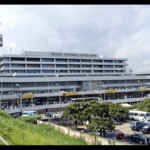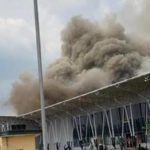
Stakeholders in the aviation industry have called for increased investment in the sector so as to stimulate economic growth.
The experts argued that there has been a progressive decline of airline operations because the industry is not attractive to investors. This, they attributed to the low profit margin in the sector, despite high cost of investment and no assurance of long-term success, which they described as precarious.
Since 2015 many airlines have gone under which include Discovery Air, First Nation Airways and recently Medview Airline, IRS Airlines and Associated Aviation; so currently Nigerian airlines on scheduled flight operate include Arik Air, Air Peace, Dana Air, Overland Airways, Azman Air and Max Air.
Operating aircraft has also declined from about 90 aircraft in 2015, to 53 currently with Air Peace having 26, Arik Air, 11, Dana Air six, Overland six Azman Air two and Max Air, three.
Some of these aircraft are currently on maintenance and therefore not operating.
Inadequate number of operating aircraft has inevitably given rise to increase in airfares from the bottom cost of N14, 000 for one-hour flight in 2015 to N25, 000 in 2019 at the time records show that there is potential increase in passenger traffic but high cost of airfares has forced air travelers to seek alternative means of transport.
The Director of Consumer Protection, Nigeria Civil Aviation Authority (NCAA), Adamu Abdullahi, told THISDAY that the federal government was willing to offer incentives to investors because things are tough for the aviation industry right now.
“The potential for profitability for investors is there. Government can give waiver if an investor comes with new ideas. Ethiopia Airlines was given concession when it agreed to operate to Kaduna airport during the reconstruction of Abuja airport runway. Government will be willing to give incentives because other countries are doing the same for their airlines,” Abdullahi said.
Also, the Secretary of the Aviation Round Table (ART) and former Commander of the Murtala Muhammed International Airport (MMIA), Group Captain John Ojikutu (retd), disclosed that passengers who planned to travel for the yuletide, had difficulty as some of them were delayed at some airports due to airlines’ inability to lift them to their destinations.
“How many aircraft are in the fleet of the domestic operators and how many are flying? It does not appear up to 50 per cent of available aircraft are flying, hence the exploitation of the travelers. Air tickets have gone up to almost thrice the normal price,” he said.
In the same vein, the Chief Executive Officer, Aero Contractors, Captain Ado Sanusi said there was the need to re-organise the industry to attract new investors.
“I think the industry needs a kind of re-organisation. It needs a kind of jolt because if you look at it this year, a lot of airlines have gone under. Medview has gone to one aircraft operation and a lot of other airlines have gone to one aircraft operation.
“Despite the fact that the passenger growth has increased, but the amount of aircraft operating in the country has reduced. Now what does that goes to tell you? It tells you that the aviation industry is not growing. The aviation industry actually is shrinking.
“Despite the fact that the passenger demand is high but the growth in the airlines are going down. The passenger growth is increasing; the market is expanding, but unfortunately the aircraft are reducing in numbers. And the reason is basically no investment coming in,” he added.
A former Director General of the Nigerian Civil Aviation Authority (NCAA), Captain Murtar Usman, also told THISDAY that the government may be inclined to give incentives to investors, noting that the investors could negotiate for concessions, tax waiver, landing permit and any other incentives, adding that the tariff waiver given to airlines by the federal government on aircraft and spares for commercial airlines is a big incentive.
“But this concession cannot be permanent. If somebody wants to develop a route he can be encouraged by giving him a waiver; but this is done in individual basis, but somebody has to come with something positive,” he said.
Industry observers projected that without more acquisition of aircraft by existing airlines and without new airlines joining the market, cost of airfares in domestic flights would be out of the reach of average Nigerian by the end of next year.
According to data obtained from the Federal Airports Authority of Nigeria (FAAN), overall passenger traffic in 2015, which was 15,222,187, dropped to 14,564,722 in 2016.
In 2017, it dropped further to 13,704,215, against the 14,564,722 in 2016. Nigeria’s air passenger traffic inched up by 3 per cent as the country recorded 14.82 million travelers in 2018, as against 14.26 million in 2017. In 2018, domestic air travelers traffic stood at 10.38 million while the international air travelers stood at N4. 48 million; but still lower than total passenger traffic in 2014, which stood at 15, 335, 772.
THISDAY






